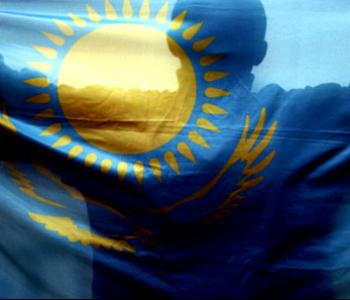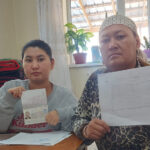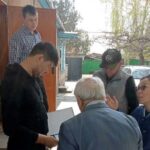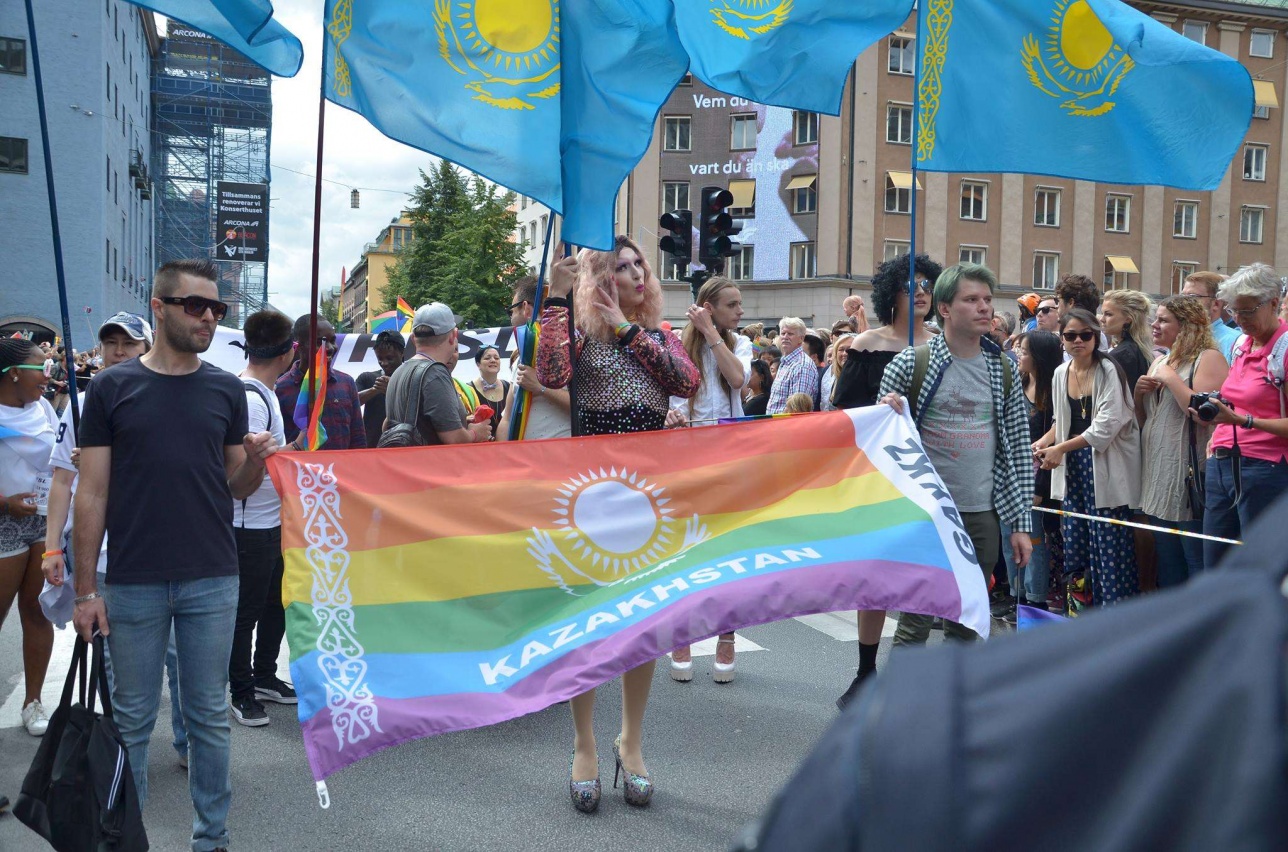Statement by
Heiner Bielefeldt
SPECIAL
RAPPORTEUR
ON FREEDOM
OF RELIGION OR BELIEF
End of visit to the Republic
of Kazakhstan
Presentation of preliminary
findings
4 April 2014
Astana
-
Introduction
From 25 March to 4 April, I have undertaken a visit to
the Republic of Kazakhstan in my capacity as United Nations Special Rapporteur
on freedom of religion or belief. First of all, I would like to express my
profound gratitude to the Government of Kazakhstan for having invited me. Let
me emphasize that my team and I have very much enjoyed the warm and often
overwhelming hospitality of the people of Kazakhstan. From the first to the
last day we have felt very welcome here. Many of the meetings we had in the
last eleven days made a deep and certainly lasting impression on me. I am particularly
grateful to the numerousinterlocutors from different Government agencies, a
broad range of civil society organizations, a number of academics and various
religious communities, both traditional and less traditional ones. Discussions
took place in Astana, Almaty and Karaganda. I learnt a lotfrom the frank
communication we had. All the exchanges of views, experiences and assessments
took place in a constructive atmosphere. I am also very grateful to the UN
Country Team led by the UN Resident Coordinator in Astana for their
professional cooperation and support.What I can present to you today has the status of
preliminary findings in which I focus on some main observations. It is
important not to mistake the preliminary findings for the official report which
will be more comprehensive, more detailed and more technical. The final report
will be the result not only of the visit but also of ongoing research based on
the many observations, impressions and questions which such a visit always
generates. During the process of preparing the official report, the intensive
learning process which has started here in Kazakhstan will certainly continue,
and I trust theconsultations with representatives of governmental and
non-governmental institutions will also go on. The official report, including a
list of recommendations, will be available at the website of the Office of the
UN High Commissioner for Human Rights (www.ohchr.org), probably by the end of
this year. It will be formally presented to the UN Human Rights Council in its
March session in 2015. -
General
observations and impressions
- A society characterized by religious pluralism
Interlocutors from Government and civil society repeatedly
pointed out that Kazakhstan, in spite of its rich and long history, is still a
young nation. Since its independence in 1991 the country has seen rapid and
far-reaching transformations, including an unprecedented pace of economic growth,
the establishment of new State agencies, the development of numerous civil
society organizations, the further unfolding of ethnic, cultural and religious
pluralism and a revival of religious life, epitomized inter alia in quite a number of impressive new religious buildings.
During my stay in Kazakhstan, I could see some beautiful mosques and churches.
Religious pluralism is a hallmark of the Kazakhstan’s
society traceable far back in history and perhaps even pre-history. Many people
with whom I discussed this issue praised the culture of religious tolerance
that has existed in the country since time immemorial. In this context, some
also mentioned specifically “nomadic” traditions of hospitality and openness
towards others. Today two big confessions – Sunni Islam (of the Hanafi school)
and Russian Orthodox Christianity – shape the religions landscape together with
a number of smaller communities, including Catholics, Lutherans, Baptists, Methodists,
Seventh Day’s Adventist, New Apostolic Church, Pentacostals, Church of Grace, Jehovah’s
Witnesses, Mormons, Shias, Ahmadiyya Muslims, Baha’is,Buddhists, Scientologists,
Hare Krishna adherents and others. One should not forget the probably high
number of atheists and agnostics or people not caring much about their
religious identities. While some of the mentioned communities have existed in
Kazakhstan for centuries, others arrived in more recent times. I have noticed
broad agreement that the relationship between the various religious communities
is generally a positive one. Incidents of interreligious clashes seem to remainvery
rare, and people mostly appreciate religious diversity as something quite
normal and natural in Kazakhstan.
This generally positive attitude does not equally
include members of non-traditional communities though. According to a survey
conducted by the Agency for Religious Affairs (ARA), the population displays
different degrees of acceptance towards traditional and non-traditional
religious communities. Members of communities perceived as “non-traditional”
confirmed that they sometimes face societal skepticism, suspicion and
discrimination. Although Government representatives mostly avoided the language
of “traditional” and “non-traditional” religions when discussing this theme (except
in the context of summits of religious leaders convened in Kazakhstan), no one
denied that adverse attitudes towards religious groups perceived as standing
outsideof the country’s traditional mosaic do exist. Moreover, widespread fear
of religious extremism (often associated with certain currents of Islam) and
worries about the influence of “sects” (generally associated with small
non-traditional groups) pose challenges to the climate of religious tolerance
which largely prevails in the society.
Religious and ethnic pluralism are almost inextricably
intertwined in Kazakhstan. While ethnic Kazakhs (who constitute the largest
ethnic group) usually understand themselves as Muslims, ethnic Russians
(constituting the second biggest group) are generally perceived as Orthodox
Christians. Such perceptions and self-identifications do not always reflect an
active religious commitment and practice. It seems that religion often serves
as a proxy for ethnicity and vice versa. This complex ethno-religious pluralism
is widely appreciated as a positive asset on which to build Kazakhstan’s
future. The “Assembly of People”, headed by the President of the Republic and
convened at least once a year at national level, reflects this existing ethno-religious
pluralism.
Conversion from one religion to another or to atheismis
possible without any State interference. While missionary activities are monitored
by the State, changing one’s own religion does not incur any State imposed
sanctions. However, given wide overlaps between religion and ethnicity, a
change of one’s inherited religion may also be perceived as a rupture away from
one’s own ethnic and family background, thus possibly leading to social
ostracism.
- The self-understanding of the State in managing
religious pluralism
In the international arena Kazakhstan aspires to serve
as a bridge between different global and regional organizations as well as
between different world religions. Since the beginning of 2013, Kazakhstan is a
member State of the UN Human Rights Council.The country also belongs to the
group of friends of the UN “Alliance of Civilizations”. Kazakhstan plays an
active role in the Organization for Security and Cooperation in Europe (OSCE)
whose chairmanship it had in 2010. Although not formally belonging to the
Council of Europe, Kazakhstan participates in the Venice Commission,which is tasked
with promoting the principles of rule of law in the broader European and
Eurasian region. Kazakhstan is furthermore a member State of the Organization
of Islamic Cooperation (OIC), and the Government has shown commitment towards
strengthening the OIC’s human rights component. Finally, the Government takes particular
pride in its role of convening regular congresses of leaders of worldreligions
and traditional religions; the fifth congress is currently in preparation.
The promotion of amicable relations between different
religions thus characterizes Kazakhstan’s political aspirations both in the
international arena as well as in the domestic sphere. This commitment for
interreligious dialogue has much to do with the existing and further emerging
religious pluralism in the country and the Government’s experiences in managing
such pluralism. The Agency for Religious Affairs (ARA) founded in 2011, plays
an important facilitating role in convening meetings of the Councils on
liaising with religious organizations at the national and at the regional
level. Such meetings take place at least on a quarterly basis. Beside closed
meetings reserved to formal members, some of the meetings are explicitly open
for broader participation. Some representatives of religious minorities explicitly
appreciated the efforts undertaken by the Government in this field, assuming
that without the active role of the State religious communities would probably meet
less regularly.
Kazakhstan understands itself as a secular State which
does not promote any particular religion or belief. Indeed, secularism belongs
to the defining characteristics of the State listed in article 1 of the
Constitution. It is widely seen as the sine
qua non for the Government to take an active and authoritative role in
managing religious diversity. During discussions,Government officials
repeatedly underlined that secularism in Kazakhstan does not indicate an
anti-religious attitude (as it was the case during Soviet rule) but rather
serves as the guarantee of State neutrality vis-à-vis the country’s religious
pluralism. However, while clearly emphasizing the need of preventing religions
from unduly influencing secular State institutions, representatives of the
Government usually gave markedly less attention to the need of protecting
religious communities from undue State control. This understanding of
secularism is also reflected in political practice. The Government seems to pursue
a policy of keeping religions largely out of State institutions, including
public schools, the administration and the military. For instance, religious
chaplains in the military do not exist in Kazakhstan. At the same time, the
State goes quite far in monitoring religious organizations, in particular
non-traditional communities. Representatives of the Agency for Religious
Affairs referred to opinion polls which indicate that secularism receives broad
approval within the populations. Calls for establishing a religious (i.e.
Islamic) State, as it exists in some of Kazakhstan’s neighbour countries, seem
to remain unpopular and rare.
The Constitution of the Republic of Kazakhstan contains
a number of human rights provisions, including freedom of conscience as
guaranteed in article 22. According to article 4, international standards have
priority over domestic law. Naturally, this also applies to the international
standards of freedom of religion or belief, as laid down in article 18 of the
International Covenant on Civil and Political Rights, which Kazakhstan ratified
in 2005. A number of State institutions, including the Human Rights Commission
under the President and the Ombudsman, have a mandate to monitor the domestic human
rights situation, based on constitutional and international standards. The
Ombudsman so far merely has an office in the capital; the establishment of
regional offices is currently under discussion.
- Security and public order concerns
The Government’s active role in managing religious
pluralism seems to be strongly, albeit not exclusively, motivated by the fear
of religious extremism. Apart from State representatives such fear was also
voiced by members of civil society organizations and representatives of
religious communities. In the face of religious militancy, violent religious
clashes and even rampant terrorism in some of Kazakhstan’s neighbour countries,
existing anxieties aremore than understandable. Indeed, everyone with whom I
talked on this issue agreed that religious extremism is a real danger and a
potential threat to the stability of the country. Some academic experts opined
that, due to the Soviet legacy, most believers lack an in-depth understanding
of their own religious traditions – a situation which,they said,mayrender
people vulnerable to the simplistic messages of religious radicalism. The fact
that religious and ethnic pluralism are nearly inextricably interwoven in
Kazakhstan mayadd yet another dimension of security concerns.
Stability, tranquility and harmony figured as
key-words in many of our discussions. I concur that the political stability
which Kazakhstan has by and large enjoyed since its independence is an
accomplishment that deserves to be appreciated and further developed. However,
the strong emphasis on stability can – and does – lead to subordinating human
rights norms, including freedom of religion or belief, to broadly defined
security and public order concerns. This might even obscure the specific
normative rank of human rights, including freedom of religion of belief. There
are reasons to recall that freedom of religion or belief is not a mere dividend
of efficient diversity management by the State, but rather has a status of a right
inherent to all human beings. Everyone should be able to practice their freedom
of religion or belief, individually and in community with others, in private or
in public. To have this freedom is a right inherent to all human beings and
thus prior to – and ultimately independent of – any acts of administrative
approval. Moreover, the ways in which people wish to realize their freedom of
religion or belief are manifold and include traditional and less traditional
forms of worship, communicative outreach within and beyond one’s own religious
community, educational efforts in families and communities, import and
distribution of religious literature, the establishment of an appropriate
religious infrastructure and many other aspects. Reportedly, the enjoyment of
these freedoms is hampered in practice, in particular for members of so called
non-traditional communities.
In discussions with government representatives we found
agreement that freedom of religion or belief (apart from its absolutely protected
forum internum dimension!) is not without possible limitations. An unlimited
right to freedom obviously could violate the rights and freedoms of others.
However, disagreements repeatedly occurred concerning the question where
precisely to draw the line. Fortunately, international human rights law gives
clear guidance in this respect.The decisive
point is that the onus of proof always falls on those who argue on behalf of
limitations, not on those who defend or practice a right to freedom. In other
words, the relationship between freedom and its limitations must remain a
relationship between rule and exception. In case of doubt the rule prevails,
and exceptions always require an extra burden of argumentation, both at the
level of empirical evidence and at the level of normative reasoning. Furthermore, for
limitations to be legitimate, they must meet cumulatively the criteriaset out
in article 18, paragraph 3 of the International Covenant on Civil and Political
Rights. Accordingly, limitations must be legally prescribed; they must be
clearly needed – i.e. as an ultimate resort – to pursue a legitimate aim;andthey
must remain within the realm of proportionality, which inter alia means they
must be confined to a minimum degree of interference needed to reach the said
aim. In addition, limitations should not have any discriminatory intentions of
effects on the enjoyment of freedom of religion or belief by certain
individuals or communities.
In discussions with Government representatives, I often
sensed a different starting point concerning the relationship between freedom
and its possible limitations. Rather than measuring the legitimacy of State
imposed limitations against the prevailing status of universal human rights, the
idea seemed to be that the exercise of freedom of religion or belief (even of
core elements of this human right)would require a specific permission by the
State. And instead of confining State imposed limitations to a minimum
interference employed as an ultimate resort, I heard pleas for broad State interventions
and control measures. Such restrictive tendencies are also reflected in the
existing legislation, including the 2011 Law on Religious Associations. Adverse
effects for the full enjoyment of freedom of religion or belief for everyone
are also tangible in practice.
I am convinced that there is no inherentantagonism
between human rights and the State’s responsibility to providedomestic peace or
stability which obviously is a big challenge in Central Asia. By demonstrating
full respect for human rights, including freedom of religion or belief, the
State can actually enhance its credibility as a guarantor of peace based on the
“recognition of the inherent dignity … of all members of the human family”, to
quote from the preamble of the first ever international human rights document,
i.e. the 1948 Universal Declaration. Moreover, full respect for human rights
provides the best preconditions for developing trust within society and also
between State institutions and the population at large. Also when countering the
scourges of religious extremism and religious hatred, the State must always fully
respect freedom of religion or belief, which after all has the status of an inalienable
and non-derogable universal right. Limitations, whenever deemed necessary must
be justified in light of the specific normative rank of this human right, and
they must be in compliance with all the criteria set out for limitations in
article 18, paragraph 3 of the International Covenant on Civil and Political
Rights.
-
Required
administrative permissions for corereligious activities
- Mandatory registration as religious association
A major issue in many discussions was the 2011 Law on
Religious Associations which required all religious communities to re-register
in order to obtain the status of a registered religious association at the
national, regional or local level. Government representatives pointed to the
fact that many (albeit not all) States require religious organizations to be
registered. Such practice is widespread and can be beneficial for religious
communities themselves.
However, registration procedures should in any case be
based on the clear understanding that freedom of religion or belief, due to its
nature as a human right, inheres to all human beings and can never be rendered
dependent on any specific acts of State approval or administrative registration.
In other words, freedom of religion or belief cannot be “created” by any
administrative procedures. Rather, it is the other way around in that
registration should be in the service of this human right, which itself
precedes any registration. Following from this general understanding,
registration should be an offer by the State, not a mandatory legal
requirement. The situation of non-registered religious communities thus assumes
the quality of an important test question about the understanding of the
normative status of freedom of religion or belief in general.
While the vast majority of religious communities in
Kazakhstan have successfully – or at least partially successfully – re-registered
after the enactment of the 2011 Law on Religious Associations, a few
applicationshave so far remained unsuccessful. As a result, some communities lost
the legal status they had previously possessed,whereas others had never been
registered at all. There are also examples of a few small groups (e.g. some
Evangelical communities) which, as a matter of their conviction, generally refuse
to register with the State. Some other religious communities only managed to
register at the local level, while failing to obtain registration status at
regional and national levels. The predominantreason is the rather high
threshold required for registration, in particular at the national level.
Amain problem concerning the administration of
religious registration is that non-registered religious groups can hardly exercise
any collective religious functions in Kazakhstan. Any of their activities, even
the common performance of prayers and rituals in private homes, are deemed
illegal and can incur serious administrative sanctions. Such punitive actions
are actually carried out in practice, possibly leading to substantial fines,
imposed under articles 374-1 and 375 of the Administrative Code and
disproportionately affecting non-traditional communities. I also heard credible
stories about police raids in the premises of some non-registered groups,
leading to confiscation of literature, computers and other property. Registration
under the Law of Public Associations does not present a viable alternative for those
communities which failed re-registration under the 2011 law, because the status
of a public association (which is much easier to obtain than registration as a
religious association) does not allow the respective associations to carry out religious
functions. Thus, non-registered religious communities and their members suffer
from serious infringements of their freedom of religion or belief.
The 2011 Law on Religious Association also hampers
religious activities of communities whose registration status is legally confined
to a certain territory. Given the high threshold for national registration,
only Sunni Islam, the Russian Orthodox Church and the Catholic Church possess
the status of religious associations for the whole country, while other
re-registered communities have merely met the thresholds for local and/or
regional registration. This means that their community practice is legally confined
to certain territorial boundaries within the country. When practicing their
religion outside of those boundaries they might confront legal problems,
including administrative sanctions. The likelihood of incurring punitive
sanctions seems to differ according to the general reputation which a religious
community has in society. Here again, the difference between traditional and
non-traditional religions comes into play. While traditional religious
communities can by and large function without problems, non-traditional and
small communities bear a considerably higher risk of being sanctioned when
stepping outside of their defined boundaries. Let me underline in this regard that
even members of minorities who described their general relationships with State
agencies as constructive complained about the lack of legal clarity and
concomitant chilling effects on their religious community life.
- Theological criteria in registration reviews?
The Government informed methat the reviews of
applications submitted for the registration or re-registration as religious
associations are always carried out in a spirit of scientific neutrality,
without resorting to theological criteria.At least the case concerning the
Ahmadiyya Muslim Community clearly deviates from this principle. The
application filed by the Ahmadiyya Community for re-registration was denied on
the basis of a review unequivocally written from the theological standpoint of
Sunni Islam. While the whole document displays religious language, the text
makes reference to the decision of the Muslim World League – which is a
religious authority – to deny Ahmadis their self-understanding as Muslims.
What defines the core elements of a particular
religion usually remains controversial within the various religions, in
Christianity not less than in Islam and other religions or beliefs. Freedom of
religion or belief gives space to such controversies, as long as they do not
lead to discrimination, hostility or violence. Thus, religious communities are
free to peacefully distance themselves from other branches or schools of
thought deemed as deviating from the defining principles of their faith. But it
cannot be the business of the State – let alone a secular State – to enforce particular
theological interpretations by measures of administrative law. In recognition
of everyone’s freedom of religion or belief, the starting point must be the
self-understanding of human beings and how they see their own beliefs.
Having lost their status as a religious association,
the Ahmadiyya Muslim Community has factually ceased to carry out any community
functions in Kazakhstan. Apart from obvious flaws in the review of their
application, the situation of this small community is also indicative of the
adverse consequence of mandatory registration in general.
- Registration of missionary activities
Individuals – including citizens of Kazakhstan – who
carry out religious functions with some degree of public visibility, are legally
required to register as missionaries. Such registration is only valid for one
year and needs to be renewed on an annual basis. The precise meaning of “missionary
activities” does not seem to be clearly defined, and the administrative practice
appears to lack in consistency. While representatives of traditional religious
communities in practice can carry outreligious functions also without specific
missionary permits, members of smaller groups have actually been sanctioned for
merely talking about their faith or answering questions in public. At times, the term “missionary activities” is
reportedly used in such a broad way as to almost cover all forms of bearing
witness and communicating about issues of faith. Lack of legal clarity in this
important field apparently creates feelings of insecurity and being held “in
limbo”. Again,I would like to emphasize that such concerns were also voiced by
members of communities who say that they in general entertainconstructive relationships
with local, regional or national Government institutions and participate in
interreligious council meetings convened under the auspices of the Agency for Religious
Affairs (ARA).
According to international standards, freedom of
religion or belief unequivocally includes the right to bear witness to one’s
conviction, to communicate within and across denominational boundaries and to
try to persuade others non-coercively. This also covers missionary activities.Leaving
aside the more specific visa questions concerning foreign missionaries coming
from abroad, such activities generally do not presuppose a formal State
approval, in particular when carried out by citizens or permanent residents of
a country.
The legal and practical problemsconnected with requiring
registration in Kazakhstan arefurther exacerbated if all sorts of manifestations
of one’s belief are subsumed under the heading of “missionary activities”,
which reportedly happens. Legal insecurity thus seriously hampers a very broad
area of religious practices, in particular for “non-traditional” religious minorities.
Moreover, even those individuals who possess a permit as missionaries may
encounter problems when moving beyond the territorial area within which their
community has obtained registration status. Another problem occurs when the
renewal of a permit takes time, with the result of adding yet another factor of
legal insecurity.
- Import and distribution of religious literature
A related issue concerns the import of religious
literature for which again State approval is required as soon as the import
exceeds the threshold for mere personal use defined by three copies of a book.
According to the ARA, in the vast majority of cases such approval is given
without further problems. The main reason for State interference in this field,
I was told,is the prevention of religious extremism and religious hatred.
Although I naturally share the view that religious extremism and religious
hatred are serious problems which require State monitoring, the question
remains whether the measures taken satisfy the criteria set out in article 18
and 19 of the International Covenant on Civil and Political Rights. Having
heard a number of examples from different religious communities I am convinced
that the restrictions imposed on the import of literature in Kazakhstan are
disproportionate.
Shops which sell religious literature need a specific
license. According to information provided by the ARA, the number of shops
permitted to distribute religious literature is above 250 nationwide, and
applications for a license are generally given without problems. While
Government representatives argued that in practice religious communities do not
encounter serious problems in receiving the literature they need, the very
requirement of a specific license nonetheless reflects an understandingin which
the relationship between a fundamental right to freedom and its limitations is turned
upside down. Instead of starting on the premise that freedom of religion or
belief has the status of a human right against which limitations need to concretely
justified, those wishing to exercise their rightsare requiredto apply for a
specific permission by the State.
-
Combating
religious hatred and religious extremism
- The need for action
As already mentioned, I fully appreciate the
Government’s efforts to counter religious hatred, intolerance and extremism.
Indeed, the stability of Kazakhstan, in particular when compared to volatile
situations in neighbor countries torn by violent religious conflicts, is a
precious asset that deserves to be upheld and further developed. In talks with
different stakeholders I sensed broad agreement on the need to remain on the
alert and take appropriate political actions in this area.
On some occasions, I referred to the “Rabat Plan of
Action on the Prohibition of Advocacy of national, racial and religious hatred
that constitutes incitement to discrimination, hostility or violence” elaborated
in October 2012 under the auspices of the UN Office of the High Commissioner
for Human Rights. The Rabat Plan of Action has found broad support in the
international community. As the title indicates, it deals with measures to be
taken by Governments and other stakeholders against hateful acts of incitement.
While requesting States a wide range of activities in this area, the Rabat Plan
of Action at the same time defines a high threshold for restrictive legal
measures, with a view to fully ensure freedom of religion, expression and other
communicative rights. A key message contained in the Rabat Plan of Action is
the call to make creative use of freedom of expression in order to counter
“hate speech” by “positive speech” and to challenge entrepreneurs of hatred by
means of communicative outreach. Those responsible in governments, religious
communities, civil society organizations, media and other organizations should
jointly and clearly speak out against incitement to hatred and publicly
demonstrate solidarity with targeted groups.
Kazakhstan’s commitment to interreligious dialogue
coincides with some important recommendations contained in the Rabat Plan of
Action. As mentioned earlier, the Government’s engagement in this field
comprises both domestic efforts of bringing religious communities together as
well as the congresses of religious leaders which Kazakhstan has already convened
four times.
- Lack of clear definition of criminal offences
When combating religious hatred Kazakhstan also
resorts to criminal sanctions. Problems arise from the overly broad terminology
used in the relevant articles. The most obvious example is article 164 of the
current Criminal Code. This article combines hatred with a number of other
phenomena like religious strife, religious discord, religious antagonism etc.
Even exclusivity or superiority claims made on behalf of certain religions
might fall within the remit of this article. As a result of broadly
circumscribed offences, all sorts of unwelcome religious claims deemed
offensive to parts of the society or to Government agencies could be penalized
by imprisonment. This leads to legal insecurity with concomitant adverse
repercussion on freedom of expression and freedom of religion or belief.
The danger of being sanctioned is not merely
hypothetical. Article 164 of the Criminal Code has been used in practice, and some
individuals sentenced under this provision are currently serving their prison
terms. In discussions with non-governmental organizations working in this area I
heard worrisome stories about allegations raised against members of different
religious communities, sometimes leading to interrogations, administrative
detention and long pre-trial detention. Given the time constraints, I could not
make assessments of individual cases all of which warrant a very detailed
analysis of their precise contexts and legal merits. This is certainly an issue
for further follow up. Nonetheless, I am convinced that articles 164 of the current
Criminal Code, due to the overly broad circumscription of offences, is a source
of major concerns. From the specific angle of my mandate, I would therefore
concur with the critical observations recently made on this issue by the UN
Committee on the Elimination of Racial Discrimination (CERD) in its comments on
Kazakhstan’s State report. What was just said about article 164 is similarly
true for other provisions, including articles 337[1]
and 337-1[2]
of the Criminal Code.
- Criminal procedures and conditions of
imprisonment
In the context of discussing criminal prosecution of religious
extremism, a number of civil society organizations furthermore complained about
a lack a transparency and fairness in criminal procedures. They reported that
it was not easy for defendants and their lawyers to get hold of important
documents on which allegations were based. I also heard about cases of long
administration detention or pre-trial detention and unacceptable conditions of
imprisonment and use of rendering in psychiatric institutions.
These issues need a more detailed analysis. The
serious nature of the allegations made motivates me to at least flag these problems
already here as important issues for further follow up.
-
Educational
initiatives
- Differentiation between religious instruction and
information about religion
When discussing educational matters, mention was made
to the Toledo Guiding Principles on Teaching about Religions and Beliefs in
Public Schools (Toledo Guiding Principles) on Information about Religion,
elaborated by the OSCE on 27 November 2007. The Toledo Guiding Principles
insist on a clear differentiation between education that acquaints students
with their own religious traditions, on the one hand, and education with the
purpose of broadening the general knowledge about religions, on the other.
While the first type of education can be termed “religious instruction”, the
second can be called “information about religion”. Moreover, whereas religious
instruction is based on the tenets of a particular faith, information should be
given in the spirit of neutrality and impartiality. Mixing or conflating both
forms of education can lead to infringements on freedom of religion or belief,
particularly in the context of mandatory school education.
The situation in Kazakhstan is very clear in this
regard. Due to the secular nature of public schools, the curriculum merely
provides for information about religions, not for religious instructions on the
tenets of a particular faith. Familiarizing the younger generation with their
specific religious traditions is thus entirely left to the religious
communities themselves.
- Religious information as part of the school
curriculum
As previously mentioned, the Republic of Kazakhstan
subscribes to a strict understanding of secularism which is also reflected in
the school curriculum. The Ministry of Education introduced religious studies –
in the sense of providing information about religions – only a few years ago.
Currently, this particular subject is merely taught during one year, i.e. at
the 9th grade. Teachers working in this field told me that the
subject meets with great interest by students who are curious to learn more
about religions. Information about religions generally takes place within the
premises of schools and, according to information received, does not include
visits of places of worship or religious sites located in the vicinity of the
school.
The text book used for informing 9th grade
students cover the different world religions in a spirit of neutrality.
However, the chapter on new religious movements assumes a warning tone, with
the purpose of alerting students to dangers of seduction or manipulation. The
chapter does not mention any specific groups in this regard.
While the dangers discussed in the text books
certainly exist, they should not be associated with one particular type of
religions. The history of religious unfortunately entails numerous examples of
force, coercion and manipulation perpetrated by traditional or new religions, by
big or small communities, by organized groups as well as less organized
movements. Associating “destructive” tendencies and concomitant dangers merely
with one type of religions may reinforce existing prejudices against small
groups often branded as “sects”. On a closer look, this type of small groups
and new religious movements comprises a broad variety of different religions
and beliefs which deserve to be addressed in respect of their distinctive
features.
When visiting Karaganda, I discussedprogrammes of
learning about history, including the history of repression under totalitarian
rule. I learnt that during the Soviet era numerous political critics and
dissenters were exiled in Karaganda and many of them were held in concentration
camps. Thus, the region has a particular historic legacy of large-scale
political atrocities which is memorized also in schools. We had in-depth
discussions on the significance which learning about history has in broader
programmes of human rights education within and outside schools.
- Promoting “religious literacy” in society
Given the importance of solid religious knowledge and
understanding for living together peacefully in a religiously pluralistic
society, programmes of religious information should go beyond school education
and also cater to the population at large.
I met with a number of organizations dedicated to the
promotion of “religious literacy” in society. Some of these organizations
closely collaborate with the ARA. In their agendas they pursued different
purposes: familiarizing people with the wealth of religious traditions,
promoting a better understanding of religious diversity, encouraging
interreligious dialogue and building resilience against religious extremism.
These purposes obviously overlap. One basic assumption explained by experts in
this field was that religious extremists, while typically claiming to present a
“pure” version of their faith, often show a very narrow-minded interpretation
of religious messages. Spreading knowledge and deeper understanding could thus
help people to build resilience against simplistic slogans. The need for
promoting “religious literacy” was associated by some with the Soviet past
which had led to a sharp decline of religious practice and knowledge in
society.
I appreciate the endeavours to promote “religious
literacy” in society. It seems to me that such a positive approach is much more
promising than campaigns undertaken by anti-sect-centres which continue to
operate in the country. While leaflets distributed by Government sponsored
anti-sect-centres appear to display a very alarming tone without always being
specific enough about the supposed threats, the promotion of religious literacy
can empower people to make up their own minds. All programmes, in particular
when enacted or sponsored by Government agencies should be based on precise
information. The OSCE Toledo Guidelines include criteria which could be used
also when designing programmes of enhancing religious literacy in society.
- Religious socialization of young people
Familiarizing the younger generation with their own
religion is a task entirely left to the religious communities in Kazakhstan.
Representatives of various communities explained how they operate in this
regard. Some raised concerns that the general lack of legal clarity in the
broad area of religious manifestations also affects their educational efforts.
I also heard stories about facilities of private religious education having
been closed down by the administration. Representatives of religious
communities, including traditional communities with generally good relations to
Government agencies, expressed their wishes for more legal clarity based on the
understanding that teaching and education belong to core elements of freedom of
religion or belief.
-
Concluding
RemarksRepresentatives of the Government repeatedly
emphasized in our talks that Kazakhstan has embarked on a process of rapid and
far-reaching transformation. The country aspires to fully use the potential
which it has as a “bridge” between different international and regional
organizations. Domestically, reforms are underway, including in the area of
law. I heard commitment to further develop the culture of amicable inter-ethnic
and inter-religious coexistence which has shaped the history of country, and I
sense a lot of good will and positive intentions.The Government is currently preparing the fifth
congress of religious leaders. I would encourage those in charge of organizing
the congress to move beyond the confines of traditional religions and also
invite representatives of other communities. Besides the usually male leaders,
women should play an active role in the dialogue, including feminist
theologians of different denominations. This could serve as signal to further broaden
the understanding and acceptance of diversity.I would also encourage a public debate on the
interpretation of secularism in Kazakhstan. In my view, a secular constitution
should provide open space for the unfolding of the existing and emerging
religious diversity, free from fear and free from discrimination. Some of those
interlocutors with whom I had a chance to discuss this issue seemed to
entertain quite similar views. However, I also came across very restrictive
interpretation according to which secularism becomes a tool for confining
manifestations of freedom of religion or belief to pre-defined territorial spaces.
An open discussion of the meaning and implications of secularism might also
help to overcome restrictive attitudes within the administration and within
law-enforcement agencies.I would like to recommend far-reaching reforms of the
2011 Law on Religious Associations based on an understanding that registration
should be optional and in the service of freedom of religion or belief. The
perhaps most important consequence would be that registration should be an
offer, not a mandatory requirement for religious community practice. Non-registered
communities must be able to operate free from discrimination and free from fear
of intimidation. Thresholds for registration at different levels (local,
regional and national) should be defined in such a way that minorities can
fully operate throughout the country. The requirement of registering missionary
activities as well as the practice of licensing the import and distribution of
religious literature should also be generally overhauled. Representatives of
religious communities and civil society organizations working in this field
should be consulted throughout this process.The currently ongoing reform of the criminal code
offers an opportunity to revise articles which, as numerous practical examples
indicate, have proven to be detrimental both to freedom of expression and to
freedom of religion or belief. This particularly concerns articles 164 and
337-1 of the Criminal Code. It will be important to discuss and monitor the
upcoming reform of the criminal code in order to ensure that the new provisions
willbe fully in line with freedom of religion or belief, in conjunction with
freedom of expression and other communicative freedoms.I would like to encourage the Ministry of Education to
further develop the programmes on religious information for students, also beyond
grade 9. School education plays a pivotal role in promoting a climate of
religious tolerance which, as I have heard again and again, remains a defining
feature of the society of Kazakhstan. I applaud the initiatives taken for the
promotion of “religious literacy” in the population at large.I share the view expressed by many interlocutors that
strictly abiding by the principles of rule of law creates the best conditions
for combating the scourges of religious hatred and religious extremism, since a
clear reliance on rule of law helps to build trust within society and between
State agencies and the population at large.Let me conclude by once again expressing my gratitude
to all those who have made this visit possible. I have learnt a lot and I have benefitted
from experiences, views and assessments shared freely with me. The hospitality
which my team and I have enjoyed here in Kazakhstan is outstanding and will
remain unforgettable.Heiner Bielefeldt
SOURCE:
http://www.ohchr.org/EN/NewsEvents/Pages/DisplayNews.aspx?NewsID=14468&LangID=E
[1]Article
337 on creation or
participation in the activity of illegal public and other associations
[2]Article 337-1 on organization of
the activities of a public or religious association or another organization
following a court decision to prohibit their activities or to dissolve them on
account of their incitement of extremism.

















